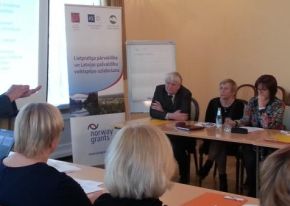Baltic States – CIS, Budget, EU – Baltic States, Latvia, Legislation
International Internet Magazine. Baltic States news & analytics
Saturday, 20.04.2024, 02:23
Latvia’s local governments amongst our most experienced actors in development cooperation
 Print version
Print version |
|---|
The Parliamentary State Secretary noted the long-standing support by the Latvian Association of Local and Regional Authorities, and Latvia’s local governments (municipalities), for EU partner countries in budget planning, negotiations with the central government, public involvement in decision making, and business promotion. In Central Asia and the EaP countries, this is regarded as invaluable experience for growth.
The Parliamentary State Secretary also indicated that this year is special in the development cooperation policy as all countries should agree on the post-2015 sustainable development agenda. The new goals to be adopted in September, in parallel to the eradication of poverty and hunger across the globe, highlight narrowing the gap between the rich and the poor, and between the countryside and the city. The goals also include an attitude of responsibility and care for the environment in order to preserve natural resources and ensure biodiversity for the coming generations. To implement those ambitious goals, all should be engaged – countries, companies, non-governmental organisations and also local governments.
Zanda Kalnina-Lukasevica stressed: “It is the transparency of the activities of public institutions, the involvement of people in decision-making and long-term planning as well as the development of the taxation system that matters most when it comes to providing opportunities for everyone to do what he or she want without respect to their place of birth.”
The Assises of Decentralised Cooperation for Development is a meeting organised the Committee of the Regions (CoR) in cooperation with the European Commission. This year, it takes place for the fourth time and brings together representatives from about 700 local and regional governments from the EU and developing countries and international organisations. The two-day event aims at strengthening the role of local governments as actors in development cooperation and promoting experience sharing between the local and regional governments in the EU and developing countries.
This time the meeting is taking place in the context of the European Year for Development. The aim of the Year for Development is to raise public awareness of development cooperation policy of the European Union and Latvia and the results of this policy.
Development cooperation supports the eradication of poverty and promotion of sustainability in other countries. The European Union, with its Member States including Latvia, is the biggest single contributor of development cooperation and provider of assistance, offering more than 55 billion euros each year in aid to Africa and other less developed regions of the world. Latvia’s priority regions in development cooperation are the countries of Central Asia and the Eastern Partnership, where Latvia’s experience with reforms is in special demand and useful.
The Committee of the Regions, which is hosting the meeting, is the European Union's advisory body composed of representatives from local and regional governments. The Latvian delegation is led by Andris Jaunsleinis, the Chairman of the Latvian Association of Local and Regional Governments, and includes delegates from Kuldīga, Jaunpils, Ventspils, Mālpils, Jēkabpils, Rīga, and their alternates from the local governments of Liepāja, Valmiera, Auce, Viļaka, Rundāle and Pārgauja. The objective of the Committee of the Regions is promotion and support of local and regional interests in the process of EU decision making.








 «The Baltic Course» Is Sold and Stays in Business!
«The Baltic Course» Is Sold and Stays in Business!

